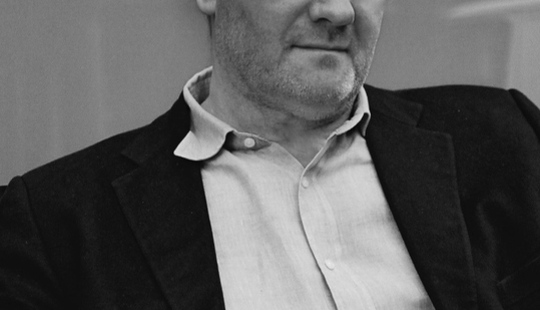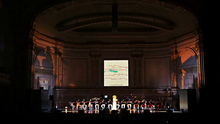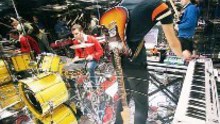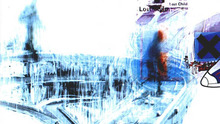Vince Power is described as "the godfather of gigs" on his own VPMG website. You might think that moniker is a tad overstated but really it's not far from the truth, if away from it at all. Having founded the Mean Fiddler in 1982, upon buying a single music venue, it expanded at a great rate of knots, most famously taking in the Reading and Leeds Festivals, as well as the running of Glastonbury festival.
In 2006 Power sold the group for a cool £39 million, with £13 million being directed his way for his share. Owing to a non compete order, Power couldn't partake in any festivals in the UK for three years, so bought Benicassim Festival. Once that order was up he founded Hop Farm Festival as a one day event in 2008 with Neil Young headlining.
The festival returns in 2010 as a two day event in the usual place, Paddock Wood, Kent. The line-up features Bob Dylan headlining, Laura Marling, Devendra Banhart, Mumford and Sons, Stornoway and new DiS favourites Villagers. We caught up with the man himself in his offices in Kilburn to discuss Hop Farm and his new approach to festivals in general.
Drowned in Sound: What else have been up to since you sold your stake in Mean Fiddler?
Vince Power: Well, I sold the Mean Fiddler in 2005 and I was contemplating on just taking it easy really. I can't even bring the word retirement to my lips, I can't even mention retirement! And then I just got bored after about two weeks so I bought the festival in Spain, Benicassim, and we've been doing that since. Three years ago, when my non compete was up I started doing The Hop Farm.
DiS: Where the did the idea for Hop Farm first spring from?
VP: It was just through three years of not doing festivals here, because obviously I used to do them all at one time. I just thought it'd be nice to take a fresh approach to it all and not to have any branding, just to get back to basics and have it nicer for the customer. I just felt at the time, it's a bit like the way the economy's going, we were in a period five years ago where everything was in abundance, and there were no problems. Everyone wanted to be VIPd and upgraded on their ticket and to get the best tent. People are never happy and they were always trying to sell you an upgrade on everything...and it'd become more about the sponsorship. The music seemed to be the secondary thing, I was just trying to get it back and it was my own feeling.
It wasn't any major problem, but I thought it'd be nice to get back to basics, which is what I did, and this is what it is. OK, you lose a little bit of money from sponsorship but sponsorship has never really helped the customer, it's always only helped the promoter. The thing about when you haven't got branding or sponsorship is that you're not indebted to any companies and you can have a choice – you can have a choice of beer and cider or whatever and food on the site – whereas when you're tied to a sponsor you can't.
DiS: Was it always that you wanted to do something in this way?
VP: Not really, it was just watching the whole thing happening and because I myself had – right back from my younger days – been someone who hates exclusion, and there was a bit of that going on at festivals where if you paid a bit more and got upgraded you could get into the VIP area, you could get backstage. I never liked it. I still don't and I've never done it in my venues, bars or clubs. I always like to say that if you've got the money and you want to come in then you should be able to come in.
DiS: It kind of puts different levels on the standard of customer?
VP: Yeah, it's horrible and as a kid I always got that myself that most places I would line up at, I'd never get in. They'd look at you like they'd already made a decision, which is awful for people when they're turned away from a place...but what they're doing is selecting people but I don't like that. If you've got money in your pocket and you're not too drunk and you don't smell then you should be in.
DiS: Where do you see Hop Farm in two, three, or even ten years time?
VP: You know, it's a long road and it'll take a few years time but I think we'll see it on the map. There's a niche there. I think it will remain the way it is, it won't be a sponsorship festival. If a company wants to come and hand out goods to the punters then I don't have a problem with that but it's never going to be a big sponsorship event. I think I can make enough money at it. Some people might say that it's hypocritical in a way because I've taken more sponsorship for Reading and Leeds when I've done it. But, at the moment it's going to be the way it is, I think I've got a niche. It's a good location too – that area doesn't have a lot of festivals going on, but yeah, it's a nice area to have a festival. I think there's enough people there to support the festival.
DiS: How much has it expanded numbers wise since it started?
VP: Well this year will sell out, but last year we had a bad year. We had a good day on the Saturday with Paul Weller, but some of the bands weren't really big enough. Sometimes on a project you've got to go with what you've got and you know your fate before you get there. You know that you're not going to sell as many tickets as you'd hope, but promoters are very optimistic people, they always think that there's going to be a big mad rush in the last week but there never is. That's what keeps us going – making excuses for ourselves.
DiS: Do you think we'll see less sponsorship because of the way the economy is going?
VP: I think, looking at it now, that the people in advertising and agencies are now looking at different ways of doing it. I read a report last week about how they're wanting to do much more under the radar sponsorship than getting in there blasting it out with every meeting you walk into you see a poster or banner. I think there's a reaction at the moment. I think the economy does actually help it in a way because people go back to basics when you're up against it and it's tight for money. I saw it happen in the 1990s as well. The bars were very utility-like until we moved into the 2000s when everything got very plush in these lounge bars and private clubs. If you go into restaurants and bars you find that the new ones are very basic which reflects the times.
DiS: Do you think you've learnt anything from the last recession?
VP: No...I wish I had, I've been through my third recession. I've been in business all my life through various things but I've been in the music business since 1982 and that was quite a recession then and then there was the '90s recession and thought "OK". We all knew this recession was coming, I certainly knew it was coming but I couldn't give into it, I couldn't say “I'm gonna do something to make sure that I don't get caught in this”...I've got caught in this because of a few things, I've got a few interests in Ireland. It's a bit like a mist coming over the mountain, you see it coming, you know it's there, but you just do nothing about it.
DiS: Is the lack of branding something that's had a positive reaction, because people tend to be anti-sponsorship generally, but obviously with it comes the money to book bigger bands?
VP: Well, some bands don't give you a break on it. Some bands will take sponsorship and I've nothing against that if they want to do, I'm not trying to make a big statement on it. What I'm trying to do is say what I wan't to do. If you come to The Hop Farm that it creates a different atmosphere because you can get the smaller things in there that you couldn't if you were at one of the bigger festivals and I know that because we had major sponsors at Reading, when we had to call it the Carling weekend, so it was a weekend where you had to drink Carling...and then listen to some music. So, yeah, I think there's a positive response to it. The first person I put on was Neil Young, who has a well known opposition to branding and doesn't think it should play any place in music. I remember when I did Neil Young first in the '90s at Finsbury Park and we did have sponsorship then but I had to go out on the stage as if Neil Young was looking out to see if he could spot any of the branding that was there. We had to place it so that he couldn't spot it going on the stage or going out.
DiS: That must've taken some planning...
VP: It did, but it actually happened, and that was a fact. He wanted to know if there was any sponsorship and was said that there was no branding there. But there was, we'd already done the deal...
DiS: I guess for a lot of up and coming bands, there's a lot more "branding by association" with organisations like Red Bull's Music programme doing so...
VP: Yeah, I think that people like Red Bull, who have done a lot helping bands and sponsorship and branding, a lot of people in the marketing business realise that there's no point driving it home. Generally they're trying to market it to younger people and they tend to have a bit of a reaction when something's being forced down their throat and just don't really want to go with it for various reasons.
DiS: People don't like being told...
VP: No, but like I said, if somebody stood outside Hop Farm and gave somebody a big bottle of cider free and it was their brand then that's up to them, I wouldn't mind.
DiS: How much say do you have in choosing the line-up itself? I mean the festival is all quite folk/blues/country-ish – this was intentional?
VP: Everything really. There's the old folk and the new ones. That is all mine. Generally when I book Benicassim, I tend to just get involved in the headliners with the staff in Madrid putting together the rest of the bill. It's the first ones that sell it really, the rest of it gives integrity and makes it look like there's somebody who knows what they're doing...

DiS: Do you think it's a blueprint that can work for other festivals, in terms of genres, do you have any other plans for similar things in other styles?
VP: No, not really. Want I want to do is to establish The Hop Farm and then...I think we're in a tough period, the economy is bad and we don't know how good or bad it's going to get but I think if we can consolidate this year and make it work. I haven't got any plans but I had plans to twin it...it's all about getting the headliners. But, to be honest, there's not as many headliners as there used to be because you've got so many festivals and there's so much competition. You've got the big boys who can throw their money at it but I can't afford to over-pay for a long period of time, if you want to take on the big operators – we all know who they are. But you can't take them on because at the end of the day there are very few bands who will do you favours and say “OK vince, we'll do it for half the money because we love you.”
I think Michael Eavis gets away with that at Glastonbury and so he should because he does some of it for charity and has done it for so long. I think the only bands that will play it for less are the ones that do Glastonbury. It's really competitive and it's all about getting the headliners at the beginning – unless you want to start at 5,000 and work it up gradually and build the event, where the event becomes bigger than the acts, like Bestival, which is more of a party atmosphere. There's one or two that have it and when you get that it's good because you don't have to depend on huge headliners. I don't think they have a lot of money but they have a brand and Rob Da Bank is quite good at getting people to go and have fun.
DiS: Obviously it's a massive balancing act in terms of priorities...
VP: Yeah, I wouldn't think he's making a lot of money to be honest. But a lot of people do festivals because they like doing it. You don't want to lose any money but if gets in your blood and I've been doing festivals since when we first took over Reading in 1989. You just want to do it and if you're not doing anything in the Summer then you feel a bit flat...
DiS: It's the same on every level of promotion really, putting on gigs at the lower end...
VP: A lot of the promoters are losing money, especially at the bottom end with the younger bands. They do it because they want to be in that environment. They don't make any money. Some of them do and then they disappear but...and then they have the opportunity and have one band that makes the opportunity for them and you're away.
DiS: What's the age range like at Hop Farm, obviously the line-up this year is quite broad in terms of appeal to different markets...
VP: I think this year's going to be very family orientated. I think we're going to have the young fans for Mumford and Sons. It's very hard, I can tell where the tickets have been sold but I can't tell you the age groups. We have 30,000 people a day so we probably have around 2,000 kids and hopefully their parents are with them. It'll be an interesting thing because you'll have the fathers – or even it could be the grandfathers – who will say “this is the man to watch” and the kids will say, “I want to watch Mumford...or Laura Marling”.
The thing about festivals is there's a basic thing when people get together and behave at festivals like they don't behave on the street. You get to a festival and everybody's your friend. You wouldn't dream of talking to that person in everyday life - there seems to be camaraderie.
DiS: How tough was it to get Dylan to play? You must've put on festivals and shows with him before?
VP: It was a lot of chasing actually. I have a little bit of history with him because I've put him on a few times before so the management and the agency know me. In that respect it's tough enough and we got him quite late. I was hanging in there and obviously it's not just Hop Farm – he's got a European tour so was on the road already...
DiS: How have you found Benicassim to be since you took ownership of it?
VP: Well, it's been a long process because obviously I don't speak Spanish. Initially I had the partners who had 20% of it with us having 80%, so they ran it until two years ago and then we had the option to buy them out and they took it up. They were the two who started it, Miguel and Jose, really nice blokes. They had a vision for it and they never really worried about making money, but they always did. The basic office and the people who worked there for the last 10 years are still there, so the infrastructure is there. I've made the site slightly bigger and improved the camping, so I've done OK on improving stuff. This year has been a tough year because of the uncertainty for British punters with the volcano ash and the Euro...
DiS: Quite a lot of British people go over now...
VP: They do, it's about 50% British at the moment and they love it. It's a great festival for people who love music. Overall I suppose it's reasonably priced because you can camp for nine days on the site and it's £150 for a weekend ticket for four days. It's not bad value. A lot of people tend to make a holiday out of it now so they'd maybe go to Barcelona first. Benicassim has a history of it, the two lads who owned it did promote specifically the British punter, to make it international. The Spanish anyway have a different way of going to festivals – they don't camp so much maybe because they don't like to do it in 40 degree heat so they leave it to the stupid foreigners! There's not much time to sleep anyway as the last act finishes at eight in the morning...
DiS: I'd imagine it's a different approach...
VP: Everything starts later. You can't really put on a band at four in the afternoon so everything starts around 8 in the evening because the temperature's so high. During the afternoon it could be forty.
DiS: Have you learnt anything from Benicassim, anything that translates to other festivals?
VP: I have learned stuff, but I don't know whether any of it translates. I've learned that people are much more tolerant, or rather I'm aware that people are much more tolerant. They embrace the festival much more because it's something good for the area. I've never been a Conservative supporter in my life but I'm glad they're trying to get rid of some of the bureaucracy. Because there's a rule around in this country that says that you have to stop all loud music at 11 o'clock, whether you're the main stage at Glastonbury or whatever. There's no tolerance. In Benicassim the local authorities will say fine “it's here for four days of music, we're happy to have it and we'll allow you to have the music at the proper levels”. That's the problem over here, you can't get past 98dB. If you're out on the site and you're past the sound tower you can't hear it and the biggest complaint is that people can't hear it, so I think those rules should be relaxed for the Summertime months. This new coalition should say that we'll let festivals go until midnight or one o'clock.
We also used to have terrible problems with Reading and Leeds in the early days because these kids would get fed up and go on the rampage because they were bored. We couldn't put on stuff whereas if we could go to two in the music we could tire them out, a bit like young kids, just tire them out.
DiS: There's more responsibility with more leniency, though?
VP: Of course, but the state has rules for everything now and it's crazy. Crazy crazy. You can't do anything you want, there's too much. You've got no way, you don't need to be responsible any more because the law will be there to be responsible for you.
DiS: What do you think the opportunities are, festival business wise now? Places abroad...
VP: I think places like Eastern Europe will have to catch up. If you're a band and you're used to getting money in the more developed parts of Europe – Italy, Spain, France, Germany – and then you go to Lithuania, Belarus, Bulgaria, Hungary, where a ticket price is a quarter...this is the dilemma we have, I get approached by promoters all the time to do stuff. But once you say to a band “OK, you're not going to get £250,000 for it, you're going to get £50,000” they tend to say “thanks, but we've got another one we're doing”. But there is a responsibility there to develop the market and some bands do it. I think Bob Dylan does it, he likes to go to new territories.
The only real source of income for most bands is live, performances and festivals seem to be the big pay day so the summer period is where most bands want to do every single festival they can. There are opportunities but the problem is that the more festivals there are, the more bands there are and the bands are not there. There's not one single band that's not touring this year but I just think there's a shortage of bands that have longevity. You have a band that will do the business and then there's the pressure to do it again and it's all about finding something new, discovering someone online and whatnot, and then it's gone again...it's a changing world. Maybe people haven't got the time any more to follow the same band and support them, they're much easier to move along to someone else.
DiS: Makes it much tougher for the bands, though...
VP: Yeah, it is tougher for the bands, much tougher. Take Florence, she's got to go to that level. She's got to it now where she can headline, she's headlining Latitude and last year she did Hop Farm. She was very good, not as popular as she is now but she's got to try and take it to the next level which is very difficult, as it is to sustain it and come out next year. All the well-established bands like Oasis if they come back and Radiohead have got to the level where they don't have to worry too much...
DiS: There's not much dropping down for them now...
VP: No, there's no dropping down, but I don't know how many recent bands who have got to that point, I don't know what'll happen to someone like Kasabian. Will they go on?
DiS: I think it's the way, as you look at Radiohead, they were from a time where you could gradually build up your profile...
VP: Yeah, and record companies kept it all within a system, they did have a big bin and they'd dump stuff but now everyone's there on Facebook. You can design a website and make your band look fantastic and you can get crowds of friends to come and see you. You might be shite, though.
DiS: A couple of years ago an awful lot of festivals undersold tickets and had to fold, do you think that was because they were booking so many bands that were playing too many other festivals and they were all a bit samey?
VP: Yes. And I also think that there were a load of festivals, the bands didn't cost much to put on and they really didn't deserve to be put on, if they were selected properly. Generally with that one or two bands got to open up things like Reading, you'd get one or two bands who were promising and they'd get to move up the bill but these things come and go. It's a problem. At the moment there are so many singer songwriters out there. Some are quite good, and some are rubbish. I think the amount of festivals has spurned more bands, or encouraged them, but then again this year there's some new festivals on the block, some have dropped off the radar. It's interesting, though, because everyone's saying they can do a festival, which they can, you just find a site. So you've got festivals from the capacity of 200 up to Glastonbury, so any capacity is out there. The best way to do it though is to stick with it because you've got the financial learning curve and the hard learning curve. You want to do something that's nice and please people but sometimes it doesn't work out like that. Sometimes the elements are against you, the acts you put on are rubbish or whatever. I think it's very hard for a small festival to survive anyway, if you get really small then it's fine but if you get to 10,000 capacity, then the next step doesn't cost you much more in the production, which is 20,000. You either need to keep really small or go for over 20,000, licensing wise it doesn't really matter...
DiS: It's the margins really...
VP: The good thing about it is that people will always try.
DiS: Survival of the fittest?
VP: You put your money down and you make your choice.
This year's Hop Farm Festival takes place from 3-4 July at The Hop Farm, Paddock Wood, Kent. Benicassim 2010 runs from 15-18 July in Spain.























